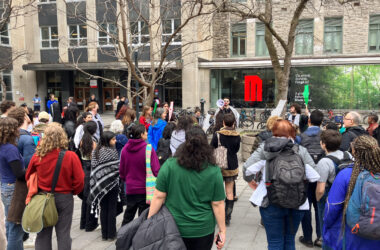In a university-wide email sent out Oct. 7, McGill announced four new COVID-19 initiatives to help track and curtail the spread of COVID-19 on campus. The protocols, which are being implemented throughout October, include measuring CO2 levels to assess the efficiency of ventilation systems; testing wastewater in student residence buildings; distributing thermometers to those in residence; and establishing a new COVID-19 dashboard to distribute weekly updated data.
Why is McGill measuring CO2 levels in some of its buildings?
CO2 builds up when ventilation is poor, so measuring CO2 levels is a way to track whether ventilation systems are operating properly. Some of McGill’s classrooms and exam rooms already have CO2 monitors, but others do not—a fact that prompted the university to conduct a systematic review of CO2 levels in spaces that previously went unassessed. Testing began on Oct. 4 and continues to be carried out by internal and external Subject Matter Experts (SME). The analysis is set to wrap up on Oct. 26. McGill has yet to announce next steps after the SMEs data is collected. Currently, the “Ventilation in your building” page details the ventilation statuses in specific rooms on campus.
What is wastewater sampling and how would it help prevent COVID-19?
Wastewater sampling is currently underway at La Citadelle, Carrefour Sherbrooke, Royal Victoria College, and Solin Hall. McGill says it will expand the sampling to other residences soon. By sampling the wastewater from these buildings for evidence of the COVID-19 virus, McGill hopes to be able to detect potential COVID-19 outbreaks early. The university has devised three alert levels—vigilance, precursor, and outbreak—that can be activated at residences depending on the results of wastewater sampling.
To support self-monitoring for potential symptoms of COVID-19, the university has decided to dispense 80 forehead thermometers to floor fellows and reception desks—which will be available to students upon request—and 750 personal stick thermometers, which are being given to students directly.
What is the new COVID-19 Situation Dashboard?
Another initiative McGill has rolled out is the implementation of a COVID-19 Situation Dashboard, which is updated every Tuesday and provides COVID-19 information from the past week. The dashboard provides information about campus and library traffic data, the number of new cases on campus, the number of cases linked to McGill classrooms, the number of calls to the Case Management Group (CMG), and the amount of contact tracing the CMG has conducted. This is more data than was previously available to the McGill community through the COVID-19 case tracker, which only stated the number of confirmed cases in a given week and whether there was evidence of community transmission.
What prompted McGill to implement these extra protocols?
Frédérique Mazerolle, a McGill media relations officer, says these new measures were devised in conjunction with public health officials and demonstrate McGill’s ongoing vigilance toward protecting the community.
“McGill University is working closely with public health officials to adopt policies and put into practice measures to protect students, staff and faculty. The University will continue to take a prudent planning approach that allows us to adapt as the health and well-being of our community remains a top priority,” Mazerolle wrote in an email to the //Tribune//. “The initiatives […] will provide new means of monitoring, keep the community informed with the latest data from around the McGill community and encourage and facilitate vaccination, which remains the best way to keep individuals, and the community at-large, safe.”
What is the McGill community’s reaction to these new measures?
David Juncker, chair of the Department of Biomedical Engineering, believes these new initiatives are useful, but wished they were implemented sooner. Juncker feels that there is still more that McGill could do to keep the community safe, such as requiring vaccination and implementing rapid testing.
“I wish they had started [CO2 measurements] at the beginning of the semester, and I would encourage [McGill] to proceed faster and to make the results available publicly as soon as possible,” Juncker wrote in an email to the //Tribune//. “[T]he university should develop a strategy for using rapid tests under different modalities based on epidemiological modeling and cost-benefit analysis. Depending on the situation, twice a week screening for everyone could help catch many cases. Alternatively, rapid tests could be used as tests-to-stay or tests-to-enter for people who […] have mild symptoms.”









